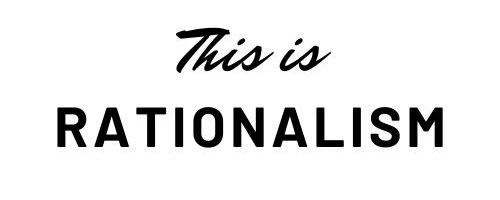
Can we trust our senses to give us true knowledge? René Descartes didn’t think so. He believed reason was the key to certainty. His approach laid the foundation for modern rationalism. Unlike empiricists, who rely on experience, Descartes sought absolute truth through logic and deduction.
He questioned everything, even his own existence, until he found something undeniable: “I think, therefore I am.” His ideas shaped philosophy, science, and mathematics. But why exactly was Descartes a rationalist? The answer lies in his unwavering trust in reason over experience. Let’s explore what made his philosophy so influential.
Background On René Descartes
Brief Biography
René Descartes was born in 1596 in La Haye en Touraine, France. He grew up in a time of intellectual upheaval. The Renaissance had challenged old ways of thinking, and new scientific discoveries were reshaping knowledge. Descartes studied at the Jesuit college of La Flèche, where he was exposed to Scholastic philosophy and mathematics. His early education focused on Aristotle’s works, but he found them unsatisfactory. He later pursued law at the University of Poitiers but never practiced. Instead, he sought a new foundation for knowledge.
In 1618, Descartes joined the Dutch military, where he met thinkers interested in mathematics and science. His travels across Europe exposed him to different intellectual traditions. In 1628, he moved to the Netherlands, where he wrote most of his major works. He sought intellectual solitude, avoiding distractions and political turmoil. His philosophy aimed to establish certain knowledge through reason. His method would later influence modern science and philosophy. Descartes died in 1650 in Sweden, where he had been invited to tutor Queen Christina. His legacy continues to shape Western thought.
Key Philosophical Works
Descartes’ writings transformed philosophy. His most famous work, Meditations on First Philosophy (1641), explores doubt, existence, and the nature of knowledge. In it, he applies systematic skepticism, questioning everything until he finds an indubitable truth: Cogito, ergo sum (“I think, therefore I am”). This work remains central to discussions on epistemology and metaphysics.
Another key text, Discourse on the Method (1637), introduces his method of doubt and rational inquiry. In it, Descartes outlines his famous four-step method for acquiring knowledge. He argues that mathematical reasoning provides a model for certainty. His Principles of Philosophy (1644) expands these ideas, applying them to physics and metaphysics. Descartes also made contributions to mathematics, developing the Cartesian coordinate system, which remains fundamental in geometry and calculus. His works laid the groundwork for rationalism, emphasizing reason as the primary source of knowledge.
Defining Rationalism
Core Principles of Rationalism
Rationalism is the belief that reason is the primary source of knowledge. Rationalists argue that certain truths exist independently of sensory experience. They claim that the mind can grasp fundamental principles through logical reasoning alone. This contrasts with empiricism, which holds that knowledge comes only from sensory experience. Rationalists emphasize innate ideas—concepts that exist in the mind before experience. They also believe in deductive reasoning, where conclusions follow logically from self-evident truths.
Descartes was a key figure in rationalism. He argued that sensory perceptions can be deceptive, so reason must be the foundation of knowledge. Rationalism influenced many fields, including mathematics, where abstract principles hold true regardless of observation. Thinkers like Spinoza and Leibniz expanded on Descartes’ ideas, reinforcing the view that knowledge is built on logical certainty rather than experience. Rationalism remains a major philosophical perspective, shaping debates on knowledge, truth, and reality.
Comparison With Empiricism
Empiricism and rationalism are two opposing views on knowledge. Empiricists, like John Locke and David Hume, argue that knowledge comes from experience. They reject innate ideas, claiming that the mind starts as a blank slate. For empiricists, all concepts arise from sensory input. They emphasize observation, experimentation, and inductive reasoning, which draws general conclusions from specific instances. Science, with its reliance on data and experimentation, aligns closely with empiricism.
Rationalists, on the other hand, trust reason over experience. Descartes’ Cogito, ergo sum is a prime example—he arrives at this truth through thought alone. Rationalists argue that mathematical and logical truths exist independently of experience. While empiricism dominates modern scientific methods, rationalism remains crucial in fields like logic, mathematics, and metaphysics. The debate between these perspectives continues to shape philosophical and scientific discussions today.
Descartes’ Philosophical Contributions
Method of Doubt
Descartes introduced the Method of Doubt as a way to find absolute certainty. He systematically questioned all beliefs, discarding anything that could be doubted. This radical skepticism led him to doubt the reliability of the senses, the existence of the physical world, and even mathematical truths. By doing so, he sought to strip away false beliefs and uncover a foundation of knowledge that could not be questioned.
He used hypothetical scenarios to challenge assumptions. For example, he proposed the idea of an “evil demon” that could deceive him into believing falsehoods. Through this process, he arrived at a single undeniable truth—his own existence as a thinking being. This foundational certainty became the basis for his rationalist philosophy.
Cogito, Ergo Sum
From his method of doubt, Descartes reached his most famous conclusion: Cogito, ergo sum (“I think, therefore I am”). He realized that even if he doubted everything, the act of doubting itself proved his existence. This insight became the cornerstone of his philosophy, establishing thought as the foundation of knowledge. It provided the first step in rebuilding a system of certainty based on reason alone.
Descartes argued that while the external world might be an illusion, his thinking mind was undeniably real. This distinction between the mind and the physical world led to his theory of dualism. His Cogito also established a shift in philosophy—one that emphasized internal reasoning over external observation. His approach influenced later rationalists and set the stage for modern debates on consciousness and identity.
Role of Reason in Knowledge
For Descartes, reason was the ultimate tool for discovering truth. He rejected the idea that sensory experience was the foundation of knowledge, arguing that our senses can mislead us. Instead, he believed that through rational thought and logical deduction, humans could uncover universal truths. This belief aligned with mathematical reasoning, where truths are derived logically rather than observed.
His commitment to reason extended beyond philosophy. He applied rational principles to science, arguing for a mechanistic view of the universe. He believed that the world operated according to logical, mathematical laws. This rationalist approach influenced thinkers like Spinoza and Leibniz, who expanded on his ideas. Descartes’ emphasis on reason continues to shape philosophical and scientific inquiry today.
Why Was Descartes Considered a Rationalist?
#1. Emphasis on Reason
Descartes believed reason was the only path to true knowledge. He argued that the senses were unreliable because they could be deceived. Instead of relying on experience, he sought absolute certainty through logical deduction. His Meditations on First Philosophy demonstrates this approach, as he systematically doubts everything until he finds a truth that cannot be questioned.
This reliance on reason aligns with the core principles of rationalism. Descartes believed that through careful reasoning, humans could reach knowledge that was beyond doubt. His influence shaped later rationalist philosophers like Spinoza and Leibniz, who also emphasized logic over sensory experience.
#2. Method of Doubt
Descartes’ Method of Doubt exemplifies his rationalist mindset. He questioned all beliefs, rejecting anything that could be doubted. This method ensured that only absolutely certain truths remained. By doubting even the most basic assumptions, he aimed to eliminate false knowledge.
This approach contrasts with empiricism, which relies on experience and observation. Descartes dismissed these as unreliable, focusing instead on what could be proven through thought alone. His radical skepticism set the stage for his rationalist conclusions, reinforcing the idea that reason, not experience, was the foundation of knowledge.
#3. Innate Ideas
Descartes argued that some ideas exist independently of experience. He believed that concepts like mathematics, logic, and even the idea of God were imprinted on the human mind from birth. These innate ideas provided a foundation for knowledge that did not rely on the senses.
This belief in innate knowledge is a defining feature of rationalism. Unlike empiricists, who claimed the mind starts as a blank slate, Descartes held that certain truths were built into human reason. His view influenced later debates on epistemology and was expanded by philosophers like Leibniz, who also supported the existence of innate ideas.
#4. Mathematical and Logical Certainty
Descartes saw mathematics as the ideal model for knowledge. He admired its precision and certainty, arguing that philosophical truths should be as clear and undeniable as mathematical ones. His use of deductive reasoning aimed to build a system of knowledge with the same logical structure as geometry.
This mathematical approach reinforced his rationalism. Instead of relying on sensory experience, Descartes sought truths that followed necessarily from self-evident principles. His Discourse on the Method applied mathematical reasoning to philosophy, influencing both rationalist thought and the development of modern scientific methods.
#5. Separation of Mind and Body (Dualism)
Descartes’ mind-body dualism further solidified his rationalist philosophy. He argued that the mind and body were fundamentally different substances. The mind, a thinking entity, could exist independently of the physical world. This idea suggested that reason was separate from and superior to sensory experience.
Dualism reinforced the rationalist belief that knowledge comes from thought rather than perception. Since the mind operates independently of the body, it can access truths beyond physical experience. This perspective influenced later debates on consciousness, free will, and the nature of reality, shaping philosophical discussions for centuries.
#6. Rejection of Empiricism
Descartes directly opposed empiricist thinkers like Locke and Hume. He rejected the idea that knowledge comes solely from sensory experience, arguing that the senses could mislead. Instead, he believed that certainty could only be achieved through rational deduction.
His rejection of empiricism defined his rationalist stance. While empiricists relied on observation and induction, Descartes trusted reason and logical certainty. His critique of empirical knowledge influenced later rationalists and shaped the ongoing debate between rationalism and empiricism in epistemology.
#7. Universal Truths
Descartes sought universal truths that applied in all circumstances. He believed that certain knowledge was not dependent on individual experiences or cultural differences. Truths like mathematical principles and the existence of the self were, in his view, universally valid.
This idea aligns with rationalism’s core belief that reason can reveal objective truths. While empiricists argue that knowledge varies with experience, Descartes maintained that reason leads to knowledge that is absolute and unchanging. His search for universal truths influenced later philosophers and helped establish rationalism as a dominant school of thought.
#8. God as a Foundation of Knowledge
For Descartes, the existence of God provided the ultimate foundation for knowledge. He argued that a perfect, benevolent God would not deceive humans about fundamental truths. This ensured that reason and clear thinking could lead to certainty.
His reliance on God as a guarantor of truth further demonstrated his rationalism. Rather than basing knowledge on experience, he rooted it in logical arguments about God’s nature. This approach connected rationalist thought with metaphysics and influenced philosophical discussions on the relationship between faith and reason.
Conclusion
Descartes was a rationalist because he trusted reason over experience. He doubted everything until he found absolute certainty in thought itself. His Method of Doubt and Cogito, ergo sum demonstrated his commitment to logical deduction. He rejected empiricism, believing that innate ideas and mathematical reasoning provided true knowledge.
His dualism reinforced the idea that the mind operates independently of the senses. Descartes’ influence shaped rationalist philosophy, inspiring thinkers like Spinoza and Leibniz. His legacy continues in debates on knowledge, consciousness, and truth. His work remains central to philosophy, proving that reason is the path to certainty.
